It’s one of the most intriguing sub-plots of the 2016 election: Why are evangelicals, who historically have supported immigration reform and a path to citizenship for deeply felt religious and moral reasons, gravitating towards the two candidates who are most hostile to policy changes that would accommodate and integrate undocumented immigrants into American life?
Syrian refugees

Editor’s Note: A lot has happened this year, and there has been much to cover — much to lament, much to praise, and much to record into history. It has been our privilege and honor to write, edit, and read along with you. In no particular order, here are our 15 favorite stories of 2015.
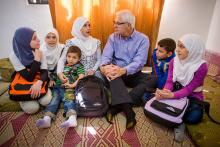
Rejecting fearmongering about the resettlement of Syrian refugees in the U.S., about 100 evangelical leaders are calling on Christians and their churches “to support ministries showing the love of Jesus to the most vulnerable, those in desperate need, and the hurting.”
“Our statement is to change a narrative of fear and instead focus on faith and compassion,” said Ed Stetzer, executive director of LifeWay Research in Nashville, Tenn. “Our desire is not to resettle everybody in another country. When a house is burning down, we need to put out the fire and rescue people fleeing the fire.”

Without mentioning Republican presidential candidate Donald Trump by name, Detroit Archbishop Allen Vigneron has blasted proposals like Trump’s that would specifically bar Muslims from the U.S., saying the idea “fractures the very foundation of morality on which we stand.”
Vigneron’s denunciation, in a letter he sent on Dec. 10 to his priests, is significant because Catholic leaders have been strong defenders of religious freedom in recent years but have been largely quiet in the wake of Trump’s controversial pitch earlier this week to bar all Muslims from the U.S.
“While the Catholic Church refrains from weighing in for or against individual candidates for a particular political office, the Church does and should speak to the morality of this important and far-reaching issue of religious liberty,” Vigneron wrote in the letter, which he also sent to imams in his state.
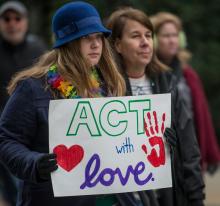
Since the Republican presidential front-runner announced after San Bernardino that he would close America’s borders to Muslims, a debate has ensued about what “radicalization” means and how far we as a nation are willing to go to protect ourselves from it. So-called liberals (and even some in the Republican party’s mainstream) have said, “Not all Muslims have been radicalized.” To this Donald Trump retorts, “Until we know which ones have been, let’s keep them all out.” The unquestioned consensus in America’s public square is that we can only be safe by figuring out who the un-American terrorists are and getting rid of them.
But where we're from in North Carolina, we should not be so naïve. We have a disproportionate share of homegrown terrorists.

Not since the World War II have United States politicians exercised such an extreme level of xenophobia, nationalism, and unapologetic bent toward fascism. Trump is calling Americans to break faith with our own constitution, which guarantees the protection of all faith traditions within our borders. This is not only un-American: It is ungodly. All humanity, regardless of religious affiliation, is made in the image of God. As such every human being is worthy of respect, dignity, and equal protection of the law. To scapegoat Muslim people is to scapegoat the image of God on earth.
There is a real threat, but it does not come from Islam. It comes from a relatively small band of misguided extremists who are leveraging our fear in order to destroy us — from within.
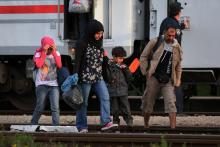
If Donald Trump had been Pharaoh of Egypt, the Holy Family never would have escaped from Herod’s persecution. Jews would have been prohibited from entering the country. Christmas features the story of a family from the Middle East leaving a homeland in fear and seeking refuge is a foreign land, just as millions do today.
If you visit Egypt and its ancient Coptic Church, you’ll see images of the Holy Family everywhere: Joseph, Mary — always on a donkey — and the infant Jesus. They are moving, wandering. You’ll find pictures of them passing by the pyramids. Egyptian Christians treasure this story for theirs is the land that offered welcome and hospitality to the Son of God when he was a refugee.
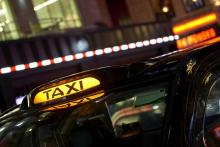
Hate crimes in America dipped across the board in 2014, except in the category of anti-Muslim crimes, which rose about 14 percent over the prior year. Given the barbaric Islamic State attacks in Paris last week and elsewhere recently, that latter trend seems destined to accelerate.
The presence of hate crimes against Muslims is no new phenomenon. Prior to the 9/11 attacks, there typically recorded between 20-30 hate crime against Muslims per year and after 2001 that number rose to nearly 500.
This summer, we saw the murder of three Muslim students in Chapel Hill, N.C. On Nov. 15 in London, a man pushed a Muslim woman into an oncoming underground train. And on Thanksgiving Day, a man in a taxicab in Pittsburgh, Pa., shot his driver in the back for being Muslim.
These incidents do not need to be listed as statistics to validate reality but they do need to be heard.

There are many reasons to recommend Brooklyn — its relatable story for one, its glowing visuals and performances for another. But Brooklyn’s commendable qualities go far beyond this, including the amount of respect writer Nick Hornby and director John Crowley give the movie’s female protagonist. Brooklyn is a movie about hard choices, and for the most part, Eilis makes those choices on her own. At different points in the film, she’s caught between romantic relationships, and familial and personal obligations. But in none of these situations does it feel like her hand is forced. The movie lets us know early that Eilis can take care of herself, and she’s never forced to compromise on that point, though she easily could have been.
Although politics aren’t really on Brooklyn’s agenda, the film also carries an unintentional point on that score worth considering. At a time when the United States is anxious about welcoming refugees and immigrants, this film reminds us that our country is made up largely of immigrants — some who look like Eilis, but also many who don’t.

The clerk in Kentucky is still trying to avoid doing her job while arguing that religion means never having to sacrifice or compromise in any way. The war-on-Christmas crowd is still passing around that story about a red coffee cup lacking snowflakes. Those who believe in an eye-for-an-eye are cheering as bombs fall in the Middle East in response to another horrific terrorist attack. Many Christians are still ignoring the calls for justice coming from the streets of Chicago, Minneapolis, and cities all across the land.
Don’t you want to throw up your hands sometimes? Or maybe just throw up?

God’s been telling the story of restoration since Genesis when we were created selem Elohim, in the image of God. We were created into perfect communion with God. From Genesis 3 until the end of the Old Testament, we see a narrative of a people in exile and God giving opportunities for reconciliation and restoration of relationship that humanity is incapable of accepting. Reconciliation is an exchange of something worthless (our condition of sin) for something immeasurably worthy (communion with God).
In the New Testament we see a biblical narrative through Jesus of now-but-not-yet restoration. In Jesus we see the coming of the Kingdom of God and get to be reconciled back to God. We even get a glimpse of an eternity where there is no more death or mourning or crying or pain.
If we truly believe we are the image of God, it changes how we approach the image of God in the world. Our call then is to actively partner with God in taking the world somewhere.
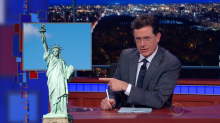
The GOP leadership really doesn’t want refugees to come to the United States. And Stephen Colbert has a few things to say about that.
Republican leaders in Congress approved a bill Nov. 19 requiring “our nation’s top security officials” to certify that each refugee poses no threat, despite the United States’ already stringent immigration guidelines. Under the guise of “security,” the bill practically functions to severely restrict the number of Syrian refugees able to enter the United States.
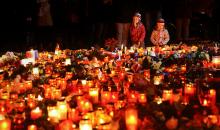
From a religious perspective, the hardest thing about confronting evil is the painful human tendency to only see it in others, in our enemies, and not see any on our side because of the blurred vision caused by the specks in our own eyes, to paraphrase the gospels. In discussing ISIS, we should clearly use the language of sin — the enormous sin of the ideological hate of ISIS finding its victims all over the world.
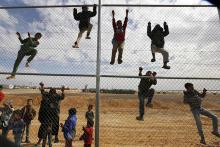
Evangelicals may be united that the Bible is the ultimate source of authority, but they are divided on how the Bible would lead us to respond to the growing crisis of refugees fleeing from Syria.
What is the best way to show Christian love and compassion? How is the church’s role different from the state’s? How do we show wisdom and prudence in securing the safety of our neighbors and nation?
These are just a few of the questions that evangelicals are grappling with. One evangelical pastor today told me, “My church members are all over the place on this!”

I’ve thought about this obedience to vulnerability in light of the current conversation our nation has been having about the refugee crisis, in particular since the attacks in Paris this weekend. The fearful calls to close our border have been disheartening, especially as we begin to enter the season of Advent. Jesus, as God incarnate, saw our sin and flaws and darkness — our hostility even — to the Light and still made himself vulnerable to live among us and die at our hand. Through the cross he offered a generous hospitality to us while we were still enemies of God — a feast of himself, for us to taste and see that God is good.
It should not be any different for us as followers of Christ. As any Christian knows, being part of the Body of Christ is often a dangerous proposition. We are in danger of getting hurt any time we come into contact with another person. We will sin against each other, we will experience conflict, and if we’re doing it right, we’ll bear each other’s suffering. We are knit together with people we may not typically associate, people who view the world in ways we may find misguided at best and dangerous at worst. It doesn’t matter — we’re still invited to the same feast and we’re still joined together in the same family, drinking out of the same cup the way family members and close friends do.

"The people who are fleeing Syria are the most harmed by terrorism, they are the most vulnerable as a consequence of civil war and strife. They are parents, they are children, they are orphans. And it is very important — and I was glad to see that this was affirmed again and again by the G20 — that we do not close our hearts to these victims of such violence and somehow start equating the issue of refugees with the issue of terrorism.
"When Pope Francis came to visit the United States, and gave a speech before Congress, he didn’t just speak about Christians who were being persecuted. He didn’t call on Catholic parishes just to admit to those who were of the same religious faith. He said, protect people who are vulnerable."
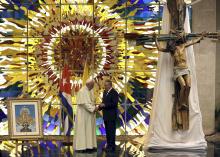
Pope Francis has decided to donate a crucifix given to him by Cuba’s president, Raul Castro, to a parish at the forefront of the European refugee crisis.
Francis will give the crucifix to parishioners on Italy’s southernmost island of Lampedusa, where thousands of refugees and migrants have arrived in recent months.
Standing more than 9 feet tall, the crucifix is made of wooden oars, as a symbol of migration. Crafted by the Cuban artist Kcho, it was given to Francis by Castro during the pontiff’s official visit to Cuba in September.
1. Read the First Chapter of Harper Lee’s ‘To Kill a Mockingbird’ Sequel
Happy Christmas in July! Read this excerpt of the much-anticipated Go Set a Watchman — due to be released on Tuesday. Or listen to the chapter, featuring narration by Reese Witherspoon, over at The Guardian.
2. Pope Apologizes for Catholic Church’s ‘Offenses’ Against Indigenous People
"I humbly ask forgiveness, not only for the offenses of the church herself, but also for crimes committed against the native peoples during the so-called conquest of America."
3. When Algorithms Discriminate
So there’s this, from the Upshot: "Research from the University of Washington found that a Google Images search for ‘C.E.O.’ produced 11 percent women, even though 27 percent of United States chief executives are women. (On a recent search, the first picture of a woman to appear, on the second page, was the C.E.O. Barbie doll.)"
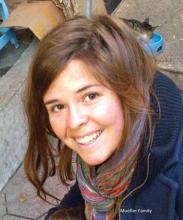
On Tuesday, the U.S. government confirmed that 26-year-old Kayla Mueller, a captive of ISIS since August 2013, has died.
While circumstances of her death remain unclear, details of the young woman's life and work — most recently helping refugees in Aleppo, Syria — have emerged in the last 24 hours, as family, friends, and members of her community share memories and anecdotes of her compassion and big heart for those in need.
The Washington Post reports:
The Rev. Kathleen Day, who headed a campus ministry that Mueller joined at Northern Arizona University, recalled that she wrote in a letter from captivity that she tried to teach crafts to her guards, including how to make origami peace cranes.
“We just delight in that,” Day said, “that Kayla remained Kayla. She said she found freedom even in captivity.”
The Post also shared a letter written by Mueller to her family while in captivity. In it Mueller expresses her experience of faith:
"I remember mom always telling me that all in all in the end the only one you really have is God. ...I have been shown in darkness,light + have learned that even in prison, one can be free."
Mueller's family on Tuesday referenced another letter in which Mueller had written of her faith, this time to her father in 2011. According to the family, Mueller wrote:
"I find God in the suffering eyes reflected in mine. ...I will always seek God. Some people find God in church. Some people find God in nature. Some people find God in love; I find God in suffering. I've known for some time what my life's work is, using my hands as tools to relieve suffering."
In their statement, Mueller's family said,
"We remain heartbroken, also, for the families of the other captives who did not make it home safely and who remain in our thoughts and prayers. We pray for a peaceful resolution of the conflict in Syria."
The family has reportedly requested that expressions of sympathy be made to causes that Kayla would have supported. KPHO reports that additional information will be made available in the coming week.
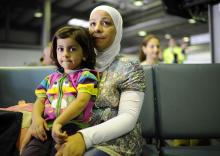
I have been literally disgusted at how “politics” has dominated the media’s response and coverage of the Syria crisis. Millions of lives are at stake, as is the security of one of the most critical regions of the world. But all many of our media pundits can talk about is how this affects politics — i.e., how this could weaken President Obama’s second term or what this might mean for Obamacare.
I heard the same media blathering when I was in London last week when the Syria chemical weapons crisis broke through. “Does the vote in Parliament hurt the Prime Minister and help his opposition?” “Is the Labor Party now up, and the Tory down?”
Who cares?!
